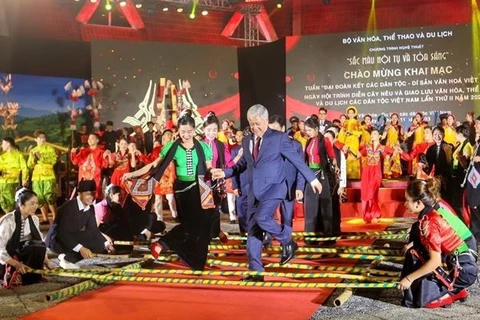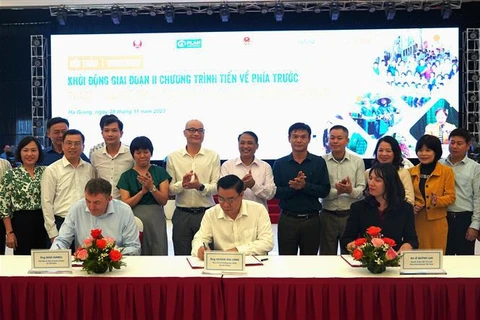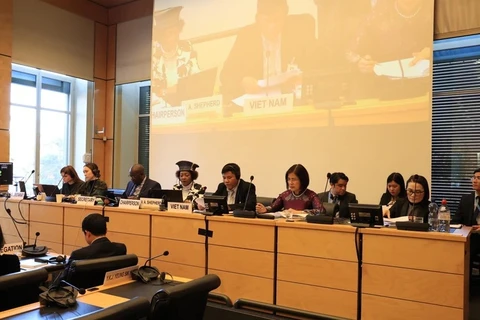 With not many toys, TV or the Internet, children at Khau Pha Pass (Yen Bai province) are still radiant with simple joy. (Photo: VietnamPlus)
With not many toys, TV or the Internet, children at Khau Pha Pass (Yen Bai province) are still radiant with simple joy. (Photo: VietnamPlus) Hanoi (VNA) - Creative ideas and digital technology are considered decisive factors for transforming the livelihoods of ethnic minority-inhabited areas, as well as contributing to Vietnam’s economic development.
Solving poverty is a complex task, especially for vulnerable groups like ethnic minorities in Vietnam. The Vietnamese Constitution has always recognised and affirmed the equal rights of all ethnic groups. The Vietnamese State has implemented a comprehensive development policy and created conditions for all ethnic minorities to develop their internal strengths, and grow together with the country.
Leaving no one behind
Globalisation and international integration are complex processes that are affecting the guarantee of the rights of vulnerable groups, especially ethnic minorities. Facing the rapid development of the economy, science and technology, trade and investment, some vulnerable-prone ethnic minority groups are at risk of falling behind and being excluded from the development process.
Among those suffering from chronic poverty in Vietnam, ethnic minorities account for a disproportionate number. Accounting for about 15% of Vietnam’s population, but they make up 90% of the country's extremely poor people, and 50% of these people are suffering from multidimensional poverty. Their average income per capita is equal to only 40-50% of the national average.
Despite these challenges, mountainous and ethnic-inhabited areas have seen positive development in recent years, especially in poverty reduction. In that development step, it is impossible not to mention creative ideas and digital technology, which are considered decisive factors for transforming the livelihoods of ethnic minorities, as well as contributing to Vietnam's economy.
 VietnamPlus e-Newspaper donates clean water tanks to 64 poor households in Pho Cao commune in Dong Van district of Ha Giang province. (Photo: VietnamPlus)
VietnamPlus e-Newspaper donates clean water tanks to 64 poor households in Pho Cao commune in Dong Van district of Ha Giang province. (Photo: VietnamPlus) As a responsible member of the international community, Vietnam has implemented the 1965 International Convention on the Elimination of All Forms of Racial Discrimination (CERD), and carrying out many policies to ensure and promote the rights of ethnic minorities. It can be said that the rights of ethnic minorities are basic human rights, recognised by international legal documents and ranked in the group of civil and political rights, and officially recognised in the two international conventions: the 1948 United Nations Universal Declaration of Human Rights (UDHR) and the 1966 International Covenant on Civil and Political Rights (ICCPR).
Vietnam has 54 ethnic groups, including 53 ethnic minorities with 14.1 million people, equivalent to 14.68% of the country's total population. The State has built a legal system with the promulgation of a series of legal documents and legal norms to ensure human rights and civil rights, including the rights of ethnic minorities. Regulations on the rights of ethnic minorities clearly demonstrate the viewpoints and policies of the Party and State towards the groups, and are also the goal and driving force of the national development cause.
In fact, ensuring that ethnic minorities are not left behind is not today's story. Right as the country entered the ‘Doi moi’ (renewal) period, the collection of reliable data on poverty in Vietnam began in 1992, when the poverty rate was estimated at 58%. Since then, Vietnam has made incredible progress in poverty reduction. According to the World Bank (WB), the overall poverty rate decreased from 49% in the early 1990s to about 4% in 2021.
Vietnam has set targets for the national poverty reduction programme in the 2021-2025 period, with each year reducing the rate of poor households according to the national multidimensional poverty standards from 1-1.5%, particularly 3% for ethnic-inhabited areas and 4-5% for poor districts. Vietnam also achieved the United Nations' millennium development goal related to poverty reduction ahead of schedule. It was also the first country in the Asia-Pacific region to adopt multidimensional poverty (MDP) measures and has been using these indicators since 2015 to monitor poverty and implement relevant policies.
Prosperity means promoting human rights
One of Vietnam's main achievements in ensuring human rights is the rapid application of creative and technological solutions from the grassroots level to develop livelihoods for ethnic minorities. Four years ago, Vietnam coordinated with the UN Development Programme (UNDP) to initiate a project called "4M Solution" (Meet - Match - Mentor - Move) to support ethnic female entrepreneurs of micro-sized enterprises for economic development. This was a series of solutions, including meeting potential production and business partners, and matching economic needs and opportunities. The solutions also included accompanying business partners and local authorities to support cooperatives managed by ethnic women, and developing and replicating successful solutions in national target programmes.
The project was tested and multiplied in the four provinces of Bac Kan, Dak Nong, Lao Cai and Son La. Currently, equipped with knowledge of production and business methods, many of the ethnic female entrepreneurs have expanded their operations, and gained access to markets, including the online commercial environment. According to UNDP, by early 2023, about 100 cooperatives increased incomes by at least 30%, generating income for more than 13,000 ethnic women.
In particular, a female entrepreneur in Bac Kan, thanks to transforming their business model to online business, has helped maintain income even during the COVID-19 pandemic, while expanding production and hiring more female labourers. The success of the 4M model has shown the way for two other national programmes on socio-economic development, as well as a sustainable poverty reduction programme for ethnic minorities living in remote areas.
Taking advantage of technology applications and promoting digital transformation in the management and implementation of policies and programmes for ethnic minorities is a key factor in promoting prosperity, not only for ethnic groups but also the Vietnamese economy. The digitalisation of self-registration, validation and management systems has tackled multi-dimensional poverty, and enhanced the capacity of e-commerce and online payment systems to support sustainable progress.
Ensuring human rights after COVID-19 pandemic
Achievements from efforts to ensure human rights cannot come in a day or two. On the international front, on October 11, 2022, Vietnam was elected for the second time to the UN Human Rights Council for the 2023-2025 term, following the 2014-2016 tenure. The election results showed that Vietnam's active participation in activities of the council, and its strong commitments to promote and protect human rights have been recognised, trusted and appreciated by the international community.
Vietnam has had and will have a stronger voice on key issues of the UN as well as the international community. This includes implementing the 2030 Agenda for sustainable development and responding to climate change and migration, and protecting and promoting the rights of women, children, people with disabilities, minorities, and migrants, especially in humanitarian crises or armed conflicts worldwide.
At the 54th session of the UN Human Rights Council that ended on October 13, the active participation of the Vietnamese delegation clearly demonstrated the country's efforts and responsibility as a member of the council for the 2023-2025 term, such as chairing several initiatives and participating in co-sponsoring many others, including some joint statements of ASEAN.
Specifically, Vietnam presided over the building and presentation of a joint statement on promoting the right to vaccination, and coordinated with Brazil and the Global Alliance for Vaccines and Immunisation (Gavi) to chair an international dialogue on promoting the right to vaccination. In addition, Vietnam and India co-sponsored and organised an international discussion on 75 years of the Universal Declaration of Human Rights and 30 years of the Vienna Declaration and Programme of Action. This follows Vietnam's initiative in February on the UNHRC's Resolution commemorating the two important international documents.
In statements, the delegation clearly stated Vietnam's policy on promoting and protecting the human rights of all people. It introduced the measures taken to support the post-pandemic recovery process, ensure social security for people, and reduce the financial burden caused by the pandemic for vulnerable groups.
Promoting socio-economic development and poverty reduction, respecting human rights, considering people as the goal and driving force of all economic development policies, and helping people have a prosperous and happy life are the most vivid and convincing proof of the Party's ideological foundation. These facts also refuted the distorted and baseless arguments of hostile forces on achievements in ensuring human rights in Vietnam.
The effective and concerted implementation of policies to ensure the rights of ethnic minorities in recent times has consolidated the trust of ethnic minorities in the leadership of the Party and State. Social consensus has been improved, the great unity of ethnic groups has been built more firmly, capable of resisting all distorted arguments of hostile forces, and political security and social order and safety maintained. Ensuring the rights of ethnic minorities will continue to create momentum for the country's development. Vietnam's reputation and influence in the international arena have continued to increase, which will be a foundational factor for deeper international integration./.























